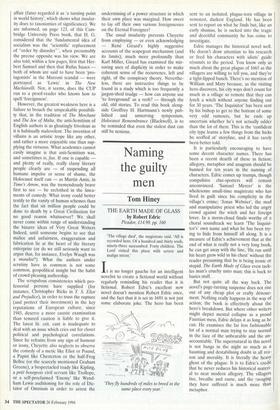Naming the guilty men
Tom Hiney
THE EARTH MADE OF GLASS by Robert Edric
Picador, £14.99, pp. 160
'The village died', the magistrate said. 'All is recorded here. Of a hundred and thirty souls, ninety-three succumbed. Forty children. The Lord visited this place with severe and malign intent.'
It is no longer gauche for an intelligent novelist to create a fictional world without regularly reminding his reader that it is fictional. Robert Edric's excellent new novel doesn't mention Robert Edric once, and the fact that it is set in 1691 is not just some elaborate joke. The hero has been
'They fly hundreds of miles to breed in the same place every year.' sent to an isolated, plague-torn village in remotest, darkest England. He has been sent to report on what he finds but, like an early shamus, he is sucked into the tragic and deceitful community he has come to investigate.
Edric manages the historical novel well. He doesn't draw attention to his research or feed his characters with idiots' guide résumés to the period. You know only as much about the great plague of 1665 as the villagers are willing to tell you, and they're a tight-lipped bunch. There's no mention of William and Mary because, as the visiting hero discovers, his city ways don't count for much in a village so remote that they can lynch a witch without anyone finding out for 30 years. 'The Inquisitor' has been sent by his bishop to get to the bottom of some very odd rumours, but he ends up uncertain whether he's not actually odder than the lot of them. This is the 'confident city type learns a few things from the hicks he scoffed at' storyline, and it has rarely been better told.
It is particularly encouraging to have some decent character names. There has been a recent dearth of these in fiction; allegory, metaphor and anagram should be banned for ten years in the naming of characters. Edric comes up trumps, though compulsive clue-spotters will remain unconvinced. 'Samuel Mercer' is the wholesome small-time magistrate who has lived in guilt since his complicity in the village's crime; 'Jonas Webster', the mad and manipulative priest who led the envy crowd against the witch and her foreign lover. In a storm-cloud finale worthy of a choral soundtrack we learn 'The Inquisi- tor's' own name and what he has been try- ing to hide from himself all along. It is a measure of Edric's achievement that at the end of what is really not a very long book, he can get away with the line, 'He ran until his heart grew wild in his chest' without the reader presuming that he is being ironic or stupid. The Earth Made of Glass even tack- les man's cruelty unto man; this is back to basics stuff.
But not quite all the way back. The novel's page-turning suspense does not rise out of any cheap plot or crafty dénoue- ment. Nothing really happens in the way of action; the book is effectively about the hero's breakdown. But where other writers might depict mental collapse as a proud Faustian mess, Edric delays it as long as he can. He examines the far less fashionable lot of a normal man trying to stay normal in the face of the unbearable and the un- accountable. The supernatural in this novel is not bangs in the night so much as a haunting and destabilising doubt in all rea. son and morality. It is literally the heavy ghost of the plague. It is to Edric's credit that he never reduces his historical =ten al to neat modern allegory. The villagers live, breathe and curse, and the ravaging they have suffered is much more than metaphor.


























































 Previous page
Previous page